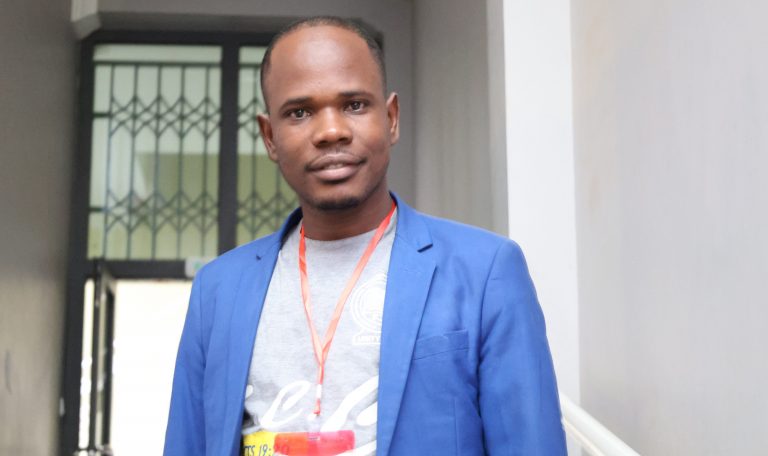Africa Higher Education Health Collaborative-KNUST in partnership with Mastercard Foundation brings the curtain down on the workshops for the second cohort of the Primary Healthcare Financing, Health Technology Assessment and Health Industry Regulatory Affairs short courses. #TheCourseExperience engages some participants on their experiences during the 5-day events which are under the Health Employment Pillar.
“It has added to my competences”-Jonathan Gmanyami (HTA ’24)

As a PhD Public Health candidate at the Kwame Nkrumah University of Science and Technology, Jonathan Gmanyami has been tasked to complete a systematic review.
Though his affiliation with the Global Health and Infectious Diseases Research Group of the Kumasi Centre for Collaborative Research in Tropical Medicine (KCCR-GHID) has endowed him with specialized skills, he thought a course in Health Technology Assessment will come in handy.
With systematic review being a strong component of the workshop, Jonathan who is also a field supervisor at GHID acquired additional skills during the course work.
“Four out of the five days were on systematic review. I could easily relate with it because that’s what I’m doing.
“It has sharpened my skills and added to my competences and it’ll go a long way to produce very fine publications,” he’s optimistic.
“I understood the levels of calibrations”-Benjamin Mayeem (HIRA ’24)

Benjamin Mayeem, DLS, a laboratory manager at Living Waters Hospital at Ejisu in the Ashanti Region of Ghana has been thinking of taking a course in health sector regulation. Chancing on an application call on social media by the Africa Higher Education Health Collaborative, he thought to apply for the Healthcare Industry and Regulatory Affairs (HIRA) course.
Indeed, facilitators’ knowledge depth impressed Benjamin but he couldn’t help to savour the course’s focus group discussions.
“The programme has been impactful. Coming here, I had certain expectations and the expectations were met. The selection of the resource persons was amazing.
“At the focus group discussions, the lectures were engaging and allowed the students to interact with them,” he said.
He added: “I’ve learnt about regulatory structures when it comes to Ghana and even beyond, because we had foreign facilitators.”
As a laboratory manager, calibrations is one of Benjamin’s fortes. However, with the gravity of the workshop, he didn’t hesitate to say, “I happen to been calibrating machines but when I came here, I understood the levels of calibrations.”
“I can easily renew clients insurance to access healthcare easily”-Patience Gaayuoni (PHCF ’24)

Ms. Gaayuoni Patience, a nurse with the Ghana Health Service in the Northern Region of Ghana has been urging patients coming to her facility to always renew their health insurance but little did she know there was actually a mobile application to facilitate the process.
During the workshop on Primary Healthcare Financing, she was introduced to this app and Patience suddenly has realized how this can improve health outcomes of residents in her community.
“It was through this course I got know this health insurance app. Through this course, I downloaded the app and registered myself and I also know with the app, I can easily renew client’s card for them to access healthcare easily,” she’s happy.
“I know how to put all the data to good use”-Malwine Abena Obuobisa (HTA ’24)

Data is a vital resource of a health information officer like Ms. Malwine Abena Obuobisa. Plying her profession at Ghana’s largest teaching hospital, Korle Bu Teaching Hospital in Accra, Malwine is sometimes overwhelmed with the plethora of data.
“In my line work, we have so much data and sometimes, ‘we ask ourselves, what then do we use them for?’” she quizzed.
Having grasped the concept of systematic review, Malwine is looking forward to collaborate with researchers to help improve health outcomes.
“Now, I know how to put all the data to good use,” she said.
“I understand a lot that goes into the health system”-Bervelyn Asantewaah Addo (PHCF ’24)

During her undergraduate years at the University of Health and Allied Sciences (UHAS) in Ho in the Volta Region of Ghana, Bervelyn took courses in universal health coverage and primary healthcare.
Bervelyn, now a research assistant and certified public health nutritionist craved more especially in primary health care financing.
“I wanted to learn more about primary health care financing,” she said.
After Bervelyn was taken through the operations of the Ghana Health Insurance Scheme and healthcare financing, she was happy with the eye-opening experience.
“This course has been very impactful. It has made me know a lot of what goes into the health system,” she’s sated.
About Africa Higher Education Health Collaborative
The Africa Higher Education Health Collaborative in partnership with the Mastercard Foundation seeks to advance healthcare in Africa through three pillars: Health Employment, Health Entrepreneurship and Health Ecosystem.
The Health Entrepreneurship pillar aims to develop an entrepreneurial mindset and culture that supports entrepreneurs to create meaningful innovations and employment opportunities in the health sector.
The Health Ecosystem pillar also aims to train and prepare a new generation of talented professionals with the broad sets of skills required to drive equitable and inclusive growth.
The Health Employment pillar also aims to expand and improve current capacities to train primary healthcare workers.



Comments (1)
Mark Owusu Kakra - May 25, 2024
That’s an impressive write up
Tnx very much Mr Jonathan